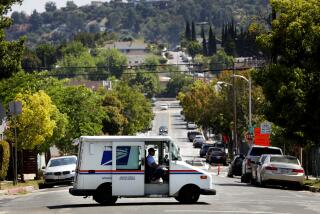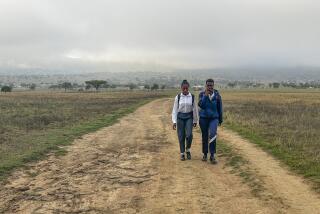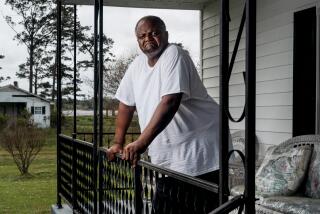Absolutes and Ambiguity in the Land of Black and White
LONEHILL, South Africa -- Willie and Celeste van der Merwe, as descendants of the original white settlers of South Africa, were a privileged species. But as they sipped tea amid the blooming flowers on their veranda back in 1992, gazing over 25 acres of land surrounded by a new electric fence, they felt trapped and afraid.
A black majority government was coming, and they were imagining the future: Riots. Corruption. A nationalized economy. Redistribution of land and wealth.
“What’s going to stop a black government from taking everything from us?” Celeste asked back then. “I can’t imagine them governing this country.”
The surprise for the Van der Merwes, and for many whites across South Africa today, is that the nightmare didn’t happen. When the African National Congress swept to victory in 1994, there were no riots. Private enterprise flourished and foreign investors flocked in. No one took away their land. And that, in a way, has been liberating.
“For me, it’s such a relief,” Celeste said. “Even before, I often felt it was very unfair that a decent black person couldn’t go into the same places we could go just because we’ve got a white skin. It wasn’t right.”
A disaster may have been averted, but it hasn’t been easy for the Van der Merwes and other whites to adjust to their new role -- that of the economically privileged but politically disadvantaged minority. A nation once run by fewer than 5 million whites is now run by all 45 million of its inhabitants. The government is creating new opportunities daily for blacks, and whites have begun to realize that it’ll be decades before that particular debt to society is paid.
Willie and Celeste still vote, but with the resigned certainty that it doesn’t matter. Blacks outnumber whites 8 to 1, and the ANC won a 70% landslide in this month’s national elections.
A recent poll found that six in 10 whites thought the country was headed in the wrong direction. By contrast, two-thirds of blacks felt the nation was on the right track, according to the poll conducted by the Washington Post, the Henry J. Kaiser Family Foundation and Harvard University.
Some days, the Van der Merwes think it’s headed in the right direction. On many others, they think it isn’t. What they are certain of is that they aren’t anywhere near the steering wheel -- or, for that matter, the brake.
“Everyone we know has just lost interest in politics,” said Celeste, who didn’t decide which party to support this month until she held the ballot in her hand. She, like her husband, opted for the multi-racial African Christian Democratic Party, which scraped together 1.6% of the nationwide tally.
“There’s not much you can do,” added their 32-year-old daughter, Noelene. “The ANC has a mass of people behind it.” Noelene voted for the Democratic Alliance, which got 12%, second to the ANC.
The family’s black maid voted for the ANC, Celeste said, “but only because she was told they’d find out if she didn’t.” For Willie, that bolsters his belief that only those with “economic ability” should be allowed to vote.
South Africa’s white population is roughly evenly divided between Afrikaners such as Willie, who traces his ancestry to the first Dutch settlers to arrive on the southern tip of Africa three centuries ago, and so-called English speakers, more recent immigrants from Europe and elsewhere. The Van der Merwes, for example, still speak Afrikaans at home.
Willie, a reserved, rail-thin 58-year-old, and his wife, Celeste, 56, remain solidly among the country’s upper middle class. Willie’s job as an accountant for a clothing company pays well enough to allow Celeste to remain a homemaker. They have health club memberships, late-model cars, a cottage at the beach and all the creature comforts they need.
But many things about their new life frustrate them. A particular vexation has been inefficiency at government offices, which they blame on the ANC’s overeager efforts to replace white lifelong bureaucrats with untrained blacks. Tasks that used to take a few minutes at the post office or an hour at the Home Affairs Ministry now take hours or days.
When she gets a notice that she has a package at the post office, Celeste said with exasperation, “I want to cry because I know I have to go down there and pick it up. You’ll have five people sitting there, doing nothing. And not one will fetch the parcels.”
In the private sector, many whites are wary of the ANC’s efforts to steer state business to black-owned companies. The Pretoria firm where Willie works lost several longtime government clients because, the state agencies said, the company owner is white. But several of those clients have returned recently to order uniforms, he said: “They’re coming back because they can’t get the service” from black-run companies.
It is rampant crime, however, that dominates the cocktail party chatter among the Van der Merwes’ all-white social circle. Just a month ago, the elderly parents of a friend were killed in their home.
“When it happens to people you know, it really has an impact,” Celeste said. “It makes you feel that you wish you could pack your things and just leave. But we realize other countries are in worse shape.” Bringing back the death penalty, she argued, is the only way to stop the most serious crime.
To Willie’s mind, the problem is “a total disregard for law and order. If you don’t enforce the law, crime will remain rife.”
A fear of crime helped drive the Van der Merwes off their rural tract of land in Krugersdorp west of Johannesburg soon after the first free elections. Although the property was protected by that $5,000 fence and dogs, they worried they were too exposed. It was a tough decision; they had purchased it from Willie’s father and had raised three daughters there over 26 years.
They sold the plot and settled in nearby Lonehill, north of Johannesburg, in a $250,000 home on a circle drive of lush trees, palms and pastel-colored flowers. They moved into a large, airy California-style home surrounded by concrete walls and, almost immediately, they missed the open spaces. “It took two years getting used to waking up and seeing other people’s houses,” Celeste said.
During their first month in Lonehill, there were four carjackings in the neighborhood.
The neighbors banded together and hired security guards, who now operate booms to control entry and exit. Nearly 80 homeowners, including a few blacks, contribute about $30 monthly each for the protection. The carjackings have stopped.
Johannesburg’s increasingly diverse suburbs are dotted with the tented shacks of these neighborhood armed guards. Private security guards now outnumber police 4 to 1 in South Africa.
“The state doesn’t see to your security, so you have to see to it on your own,” Willie said. “The police are preoccupied with more serious crime. That’s the new South Africa.”
Yet they’ve come to grudgingly admire a few things that the black rulers have done, especially with the economy. The ANC, which once preached socialism with its South African Communist Party ally, has overseen a six-year period of steady economic growth.
When the ANC first appointed Tito Mboweni, a onetime student activist and London-trained economist, as governor of the Federal Reserve, “I was very worried, to be quite honest,” Willie said. “But I appreciate what they’ve done. It was a surprise. They did their homework.”
Still, the rate of unemployment -- more than 25%, by government estimates -- has whites worried that their children will one day be squeezed between the lack of jobs and the push for affirmative action. But Willie remains confident that white people with skills can find a way to survive.
In fact, Noelene, their youngest daughter, runs her own business out of their house, teaching sewing classes five days a week in a converted garage. She and her 8-year-old daughter moved back home after she divorced.
Among Noelene’s 40 students is the wealthy black owner of a funeral home. “She does as many as 60 funerals a week,” Noelene said, admiringly. “She says that she got into the business because she wasn’t going to sell fish and chips like her daddy.”
The Van der Merwes have watched a growing number of wealthy blacks move into the Johannesburg suburbs since 1994. Some whites suspect that the government has been handing over businesses and cushy jobs to their black supporters. “If he’s earned it, I admire him for it,” Willie said. “He just mustn’t have stolen it.”
All of their frustrations about the country’s growing pains, though, melt away on Friday nights, when they gather around the television to watch “Gauteng-Aleng-Aleng,” a popular Afrikaans-language sitcom.
Set in a fictional government department, the program pokes fun at inept bureaucrats but also racist and sexist attitudes. The new director of the department is an “empowered” black woman, who used to toil away in the basement. Her deputy is the white man who used to be her boss and now -- you guessed it -- toils away in the basement.
The show’s title has silly significance for South Africans. Gauteng, the Sotho word for gold, is the new name of the largest ANC-run province, which includes Johannesburg, Soweto and Pretoria.
Gauteng is pronounced “how-ting” and the show’s title sounds like “How Ding-a-ling-a-ling.” The opening song’s lyrics go: “Gauteng-Aleng-Aleng, where crime is the order of the day. Still, it’s nice to live in Gauteng-Aleng-Aleng.”
“We just laugh about these things,” Celeste said. “Sometimes, it upsets me that we all just accept the state of affairs. But there’s nothing you can do about it, so you just carry on.”
More to Read
Start your day right
Sign up for Essential California for news, features and recommendations from the L.A. Times and beyond in your inbox six days a week.
You may occasionally receive promotional content from the Los Angeles Times.







